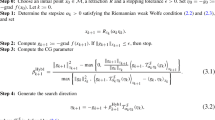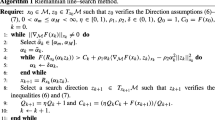Abstract
Recently, the approximate Karush–Kuhn–Tucker (AKKT) conditions, also called the sequential optimality conditions, have been proposed for nonlinear optimization in Euclidean spaces, and several methods to find points satisfying such conditions have been developed by researchers. These conditions are known as genuine necessary optimality conditions because all local optima satisfy them with no constraint qualification (CQ). In this paper, we extend the AKKT conditions to nonlinear optimization on Riemannian manifolds and propose an augmented Lagrangian (AL) method that globally converges to points satisfying such conditions. In addition, we prove that the AKKT and KKT conditions are indeed equivalent under a certain CQ. Finally, we examine the effectiveness of the proposed AL method via several numerical experiments.
Similar content being viewed by others
Data availability
Not applicable.
References
Absil, P.-A., Mahony, R., Sepulchre, R.: Optimization Algorithms on Matrix Manifolds. Princeton University Press, Princeton (2008)
Aihara, K., Sato, H.: A matrix-free implementation of Riemannian Newton’s method on the Stiefel manifold. Optim Lett. 11, 1729–1741 (2017)
Andreani, R., Birgin, E.G., Martínez, J.M., Schuverdt, M.L.: On augmented Lagrangian methods with general lower-level constraint. SIAM J. Optim. 18, 1286–1309 (2007)
Andreani, R., Birgin, E.G., Martínez, J.M., Schuverdt, M.L.: Augmented Lagrangian methods under the constant positive linear dependence constraint qualification. Math. Program. 111, 5–32 (2008)
Andreani, R., Fukuda, E.H., Haeser, G., Santos, D.O., Secchin, L.D.: Optimality conditions for nonlinear second-order cone programming and symmetric cone programming. Optimization online (2019)
Andreani, R., Martínez, J.M., Svaiter, B.F.: A new sequential optimality condition for constrained optimization and algorithmic consequences. SIAM J. Optim. 20, 3533–3554 (2010)
Andreani, R., Haeser, G., Martínez, J.M.: On sequential optimality conditions for smooth constrained optimization. Optimization 60, 627–641 (2011)
Andreani, R., Haeser, G., Viana, D.S.: Optimality conditions and global convergence for nonlinear semidefinite programming. Math. Program. 180, 203–235 (2020)
Bergmann, R.: manopt.jl - Optimization on Manifolds in Julia. http://www.manoptjl.org (2019)
Bergmann, R., Herzog, R.: Intrinsic formulation of KKT conditions and constraint qualifications on smooth manifolds. SIAM J. Optim. 29, 2423–2444 (2019)
Birgin, E., Martínez, J.M.: Practical Augmented Lagrangian Methods for Constrained Optimization. SIAM, Philadelphia (2014)
Boumal, N.: An introduction to optimization on smooth manifolds. http://www.nicolasboumal.net/book (2020)
Boumal, N., Mishra, B., Absil, P.-A., Sepulchre, R.: Manopt, a Matlab toolbox for optimization on manifolds. J. Mach. Learn. Res. 15, 1455–1459 (2014)
Huang, W., Absil, P.-A., Gallivan, K. A., Hand, P.: ROPTLIB: an object-oriented C++ library for optimization on Riemannian manifolds. ACM Trans. Math. Softw. 44, 43:1–43:21 (2018)
Gallot, S., Hulin, D., Lafontaine, J.: Riemannian Geometry, 3rd edn. Springer, Berlin (2004)
Kanzow, C., Steck, D., Wachsmuth, D.: An augmented Lagrangian method for optimization problems in Banach spaces. SIAM J. Control Optim. 56, 272–291 (2018)
Lichman, M.: UCI machine learning repository (2013)
Liu, C., Boumal, N.: Simple algorithms for optimization on Riemannian manifolds with constraints. Appl. Math. Optim. 82, 949–981 (2020)
Martin, S., Raim, A. M., Huang, W., Adragni, K. P.: ManifoldOptim: An R interface to the ROPTLIB library for Riemannian manifold optimization. arXiv preprint arXiv:1612.03930 (2016)
Sato, H.: Riemannian Optimization and Its Applications. Springer Nature, Switzerland (2021)
Sato, H., Aihara, K.: Cholesky QR-based retraction on the generalized Stiefel manifold. Comput. Optim. Appl. 72, 293–308 (2019)
Sato, H., Iwai, T.: A Riemannian optimization approach to the matrix singular value decomposition. SIAM J. Optim. 23, 188–212 (2013)
Sato, H., Iwai, T.: Optimization algorithms on the Grassmann manifold with application to matrix eigenvalue problems. Japan J. Indust. Appl. Math. 31, 355–400 (2014)
Sato, H., Iwai, T.: A new, globally convergent Riemannian conjugate gradient method. Optimization 64, 1011–1031 (2015)
Sato, H., Kasai, H., Mishra, B.: Riemannian stochastic variance reduced gradient algorithm with retraction and vector transport. SIAM J. Optim. 29, 1444–1472 (2019)
Townsend, J., Koep, N., Weichwald, S.: Pymanopt: A Python toolbox for optimization on manifolds using automatic differentiation. J. Mach. Learn. Res. 17, 1–5 (2016)
Wu, H., Luo, H., Ding, X.: Chen, G: Global convergence of modified augmented Lagrangian methods for nonlinear semidefinite programmings. Comput. Optim. Appl. 56, 531–558 (2013)
Yamakawa, Y., Okuno, T.: Global convergence of a stabilized sequential quadratic semidefinite programming method for nonlinear semidefinite programs without constraint qualifications, arXiv (2018)
Yang, W.H., Zhang, L.-H., Song, R.: Optimality conditions for the nonlinear programming problems on Riemannian manifolds. Pac. J. Optim. 10, 415–434 (2014)
Zhu, X., Sato, H.: Riemannian conjugate gradient methods with inverse retraction. Comput. Optim. Appl. 77, 779–810 (2020)
Acknowledgements
The authors would like to thank two anonymous referees for their valuable comments which gave us a lot of constructive suggestions.
Author information
Authors and Affiliations
Corresponding author
Additional information
Publisher's Note
Springer Nature remains neutral with regard to jurisdictional claims in published maps and institutional affiliations.
Appendix A
Appendix A
We present the proof of Lemma 2.
Proof of Lemma 2
We prove this lemma by contradiction. Suppose that \(\mathop{{\rm grad}}\theta (w) \not = 0\). Since the optimal solution \(w \in {{\mathcal {M}}}\) satisfies \(w \in \mathrm{int}B(x^{*}, \delta )\), there exists \(\varepsilon > 0\) such that \(B(w, \varepsilon ) \subset B(x^{*}, \delta )\). Let \(t > 0\) and \(u := - \mathop{{\rm grad}}\theta (w)\). Note that \(u \not = 0\). We consider the Taylor expansion \(\theta (\mathrm{Exp}_{w}(tu)) = \theta (w) + t \langle \mathop{{\rm grad}}\theta (w), u \rangle _{w} + t r(t)\), where \(r : \mathbb {R}_{+} \rightarrow \mathbb {R}\) is a certain function satisfying \(r(t) \rightarrow 0\) as \(t \rightarrow 0\). This result implies that
Since \(\mathrm{Exp}_{w}(tu) \rightarrow w\) and \(r(t) \rightarrow 0\) as \(t \rightarrow 0\), there exists \(t_{0} > 0\) such that \(\mathrm{Exp}_{w}(t_{0}u) \in B(w, \varepsilon )\) and \(r(t_{0}) \le \frac{1}{2} \Vert u \Vert _{w}^{2}\). Note that \(v := \mathrm{Exp}_{w}(t_{0} u)\) is feasible because \(v \in B(w, \varepsilon ) \subset B(x^{*}, \delta )\). Substituting \(t = t_{0}\) into (A.1) yields \(\theta (v) \le \theta (w) - \frac{t_{0}}{2} \Vert u \Vert _{w}^{2} < \theta (w)\). However, this contradicts the assumption that w is an optimal solution. \(\square \)
Lemma 3 is shown in the following.
Proof of Lemma 3
Let \(S_{+} := \{ j \in \mathbb {N}; \, [\xi ]_{j} \ge 0 \}\), \(S_{-} := \{ j \in \mathbb {N}; \, [\xi ]_{j} < 0 \}\), \(T_{+} := \{ j \in \mathbb {N}; \, [\xi ]_{j} \ge [\zeta ]_{j} \}\), and \(T_{-} := \{ j \in \mathbb {N}; \, [\xi ]_{j} < [\zeta ]_{j} \}\). The left-hand side of the inequality is rewritten as
Meanwhile, we obtain
Note that \(S_{-} \subset T_{-}\) is a sufficient condition under which the desired inequality holds. Indeed, if \(S_{-} \subset T_{-}\), then from (A.2) and (A.3), we have
We take an arbitrary element \(j \in S_{-}\). The definition of \(S_{-}\) and \(\zeta \in \mathbb {R}_{+}^{n}\) imply that \([\xi ]_{j} < 0 \le [\zeta ]_{j}\). Note that the definition of \(T_{-}\) yields \(j \in T_{-}\), i.e., \(S_{-} \subset T_{-}\). Therefore, the proof is completed. \(\square \)
Rights and permissions
About this article
Cite this article
Yamakawa, Y., Sato, H. Sequential optimality conditions for nonlinear optimization on Riemannian manifolds and a globally convergent augmented Lagrangian method. Comput Optim Appl 81, 397–421 (2022). https://doi.org/10.1007/s10589-021-00336-w
Received:
Accepted:
Published:
Issue Date:
DOI: https://doi.org/10.1007/s10589-021-00336-w




